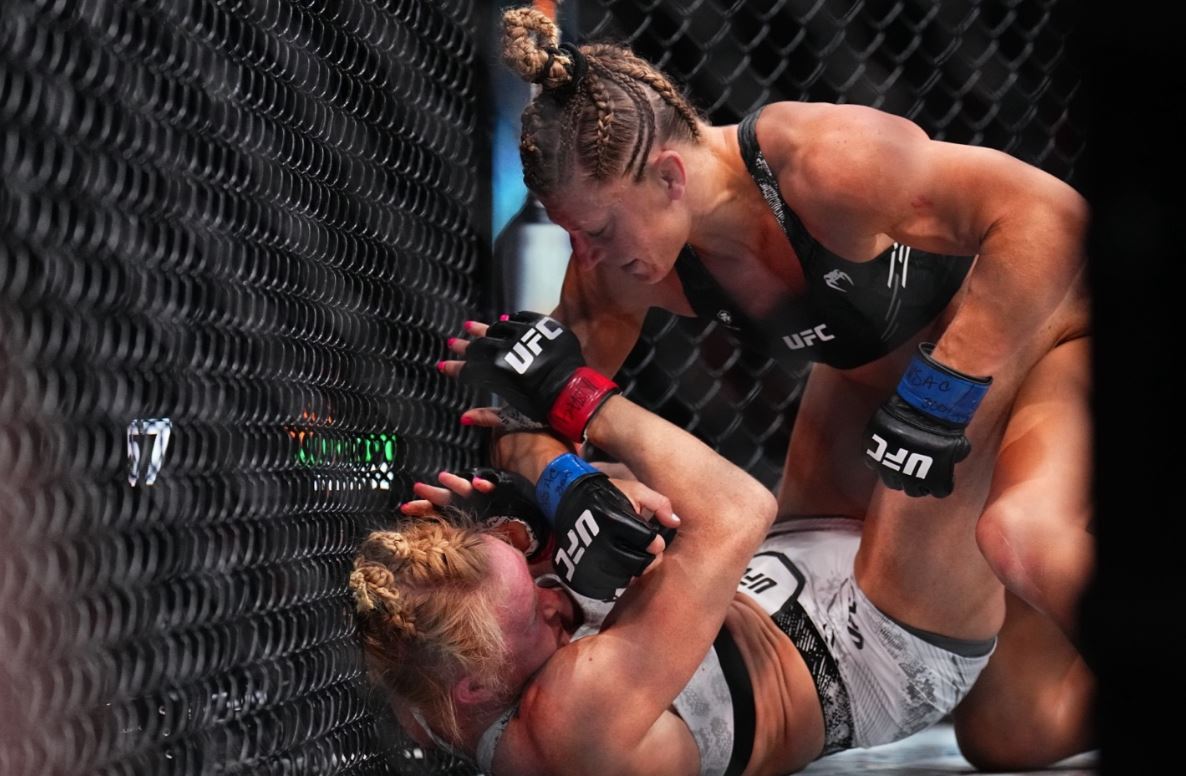While the spotlight at UFC 320 rightly shines on the main event title clashes, a more subtle, yet equally intense, battle unfolded behind the scenes during the weigh-ins. This one, however, wasn`t fought with fists, but with principles and allegations of unfair play, casting a shadow over what should have been a straightforward pre-fight formality.
The Unforgiving Scale: Chiasson`s Miss and Santos`s Outcry
The highly anticipated UFC 320 card, brimming with championship implications and intriguing matchups, unexpectedly brewed a cauldron of controversy well before the first punch was thrown. The focal point of this pre-fight drama centered around the women`s bantamweight bout between the No. 5-ranked Macy Chiasson and her opponent, Yana Santos. As is customary, fighters stepped onto the scale to make their contracted weight, a ritual often more grueling than the fight itself. Chiasson, however, failed to meet the 135-pound bantamweight limit, clocking in 1.5 pounds over.
For Yana Santos, this was not just a mere procedural misstep; it was an act of profound disrespect. Her reaction was swift and public, taking to social media to voice her profound displeasure. “Imagine signing a contract and showing up overweight AGAIN,” Santos passionately wrote on X, highlighting Chiasson`s previous struggles with the scale. “Some of us respect the grind. Others disrespect the sport. See you Saturday.” Her words painted a clear picture of frustration and a perceived breach of professional conduct.
A Refusal, A Revelation: The Allegation of Unfair Play
What began as a typical weight miss escalated sharply with Santos`s subsequent revelation. According to her, the Nevada State Athletic Commission offered Chiasson an additional hour to attempt to shed the remaining 1.5 pounds – a common courtesy extended in such scenarios. Yet, Santos alleges, Chiasson declined this opportunity. “The worst part? The commission offered her an extra hour to make weight. She REFUSED,” Santos claimed, her frustration palpable. The implication was clear: “Why? Because she wants an unfair advantage. This isn’t just unprofessional—it’s straight-up dirty.”
This accusation shifts the narrative from a simple failure to an intentional tactical maneuver. In a sport where every fraction of an ounce can mean a competitive edge, deliberately refusing an option to comply with rules can be seen as an attempt to enter the octagon with a physical advantage. It sparks a contentious debate: Is a fighter who misses weight and then refuses further attempts exhibiting a lack of discipline, or calculatingly seeking an edge, knowing the fight will still proceed (often with a percentage of their purse forfeited to the opponent)? Santos, clearly, believes it`s the latter.
Professionalism on Trial: The Broader Implications for MMA
Weight cutting is a brutal, often dangerous, aspect of mixed martial arts. It`s a testament to a fighter`s discipline, dedication, and professionalism. The expectation is that fighters will honor their contractual obligations, not only for fair play but also for their own safety and that of their opponents. When a fighter repeatedly misses weight, or, as alleged here, actively declines an opportunity to rectify the situation, it raises serious questions about the integrity of the competition.
Such incidents can erode trust within the fighting community and among fans. It suggests that the competitive balance, which the sport strives to maintain through weight classes, is being deliberately tilted. While the pressures are immense, the responsibility to make weight is foundational to the sport`s structure. These moments become a litmus test for professionalism, revealing the character of athletes beyond their fighting skills.
A Call for Stricter Sanctions: Thiago Santos Weighs In
Adding significant weight to Yana Santos`s claims was the intervention of her husband, former UFC light heavyweight title challenger Thiago Santos. ‘Marreta,’ a seasoned veteran of the sport, didn`t mince words, expressing his dismay on social media. “Unbelievable how some people are not professional in this sport,” he wrote, echoing his wife`s sentiments. He further highlighted a troubling pattern: “It’s Yana’s 4th opponent that didn’t make the weight. Some (stronger) punishments (have) to be made.”
Thiago Santos`s call for “stronger punishments” resonates with a broader sentiment within the MMA community. Current penalties, typically a percentage of the fighter`s purse, are often seen as insufficient deterrents for repeat offenders. The argument is that if the competitive advantage gained by being overweight outweighs the financial penalty, some fighters might view it as a calculated risk rather than a severe consequence. This incident at UFC 320 thus reignites the long-standing debate about how commissions and organizations should enforce weight class rules to ensure a truly level playing field.
As UFC 320 proceeds, the drama surrounding Chiasson`s weight miss and Santos`s accusations serves as a stark reminder that the battles in combat sports extend far beyond the striking and grappling inside the octagon. They include the silent wars against the scale, the ethical dilemmas of sportsmanship, and the ongoing quest for integrity in a fiercely competitive arena. Whether these accusations ultimately impact Chiasson`s future or prompt a reevaluation of weight-cutting regulations, one thing is certain: the fight for fairness in MMA is far from over.

